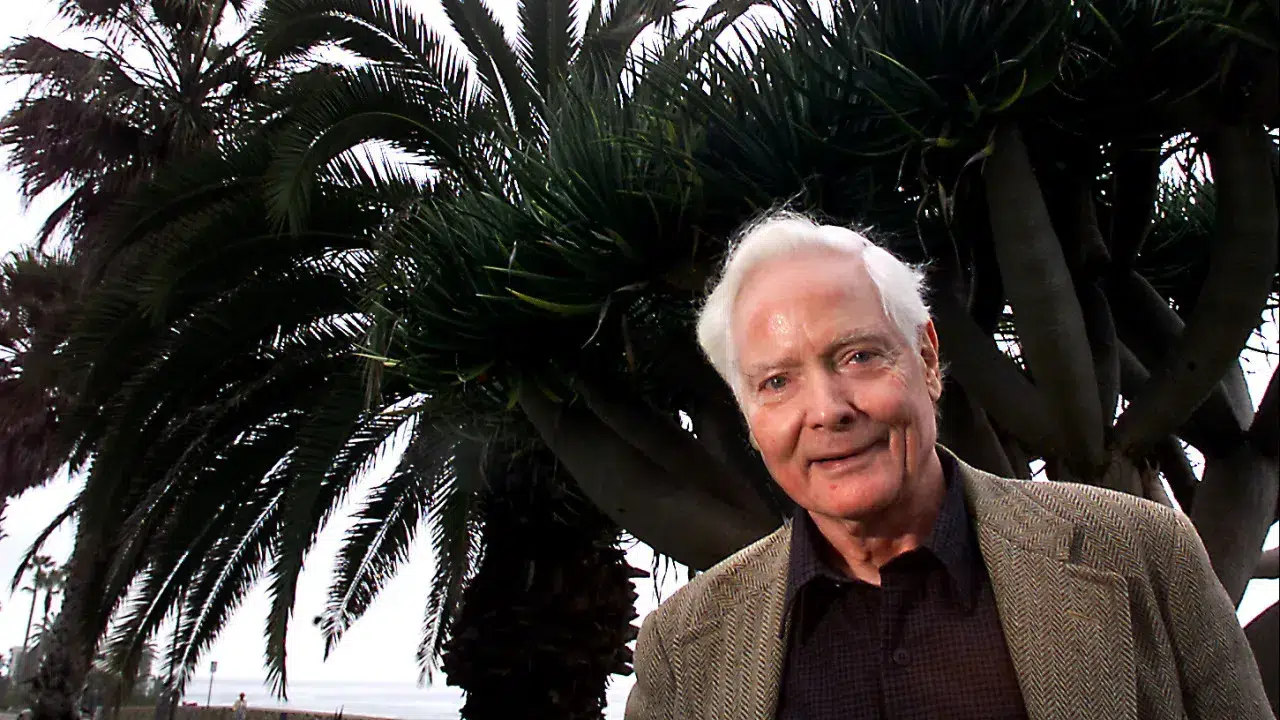
With “versions, collection and introduction” by the poet and translator Jorge Sousa Braga, ‘Lamento por uma pedra e outros poemas’, a bilingual edition by Assírio & Alvim, showcases over 60 years of literary production by W.S. Merwin (1927-2019).
The work is derived from 17 of the writer’s most celebrated books, including early works like ‘The Dancing Bears’ (1954) and ‘Green with Beasts’ (1956), the final ‘Garden Time’ (2016), and distinguished titles ‘Travels’ (1994) and ‘The River Sound’ (1999), not to forget Pulitzer Prize winners ‘The Carrier of Ladders’ (1970) and ‘The Shadow of Sirius’ (2009).
“One of the most important English-speaking poets of our time” and “one of the most innovative of recent decades,” reads the anthology’s presentation, which recalls Merwin as an “outstanding translator, ardent ecologist and anti-militarist, […] a lover of Eastern culture and a cultivator of a new and unburdened poetry.”
The writer translated classics such as Euripides, Dante, and Sá de Miranda, and authors like García Lorca, Neruda, Borges, Brodsky, Mandelstam, João Cabral de Mello Neto. He wrote about Fernando Pessoa. He traveled extensively, living in Portugal, France, London, and Chiapas, Mexico; he socialized with notable figures such as Robert Lowell, T.S. Eliot, Sylvia Plath, and Ted Hughes.
Merwin was a citizen who opposed the Vietnam War and supported liberation movements in Africa. He was a man who loved gardens and revived forests.
In February 1962, a year after the start of the war in Angola, he opposed the “cynical and brutal” violence of Salazar’s dictatorship and Portuguese colonial power over African peoples, in the pages of The Nation magazine, concerning the translation of poems by Agostinho Neto, then detained in Luanda.
William Stanley Merwin was born in New York on September 30, 1927, and grew up in the states of New Jersey and Pennsylvania. The son of a Presbyterian minister, religious hymns enabled him to write his first poems in childhood.
In 1944, he entered Princeton University, where he was mentored by critic R.P. Blackmur and poet John Berryman, and befriended poet Galway Kinnell and pianist Charles Rosen.
Wallace Stevens, Ezra Pound, John Milton, and Percy Shelley were his literary heroes, recalls Sousa Braga in the “brief biobibliographical note” opening the anthology.
A proponent of non-violence, Merwin was admitted to a psychiatric unit when he regretted enlisting at the end of World War II. Released and deemed unfit for military service, he returned to Princeton and completed his course in 1947. At the graduation ceremony, he read a poem to the absent students who had died in the conflict.
That year, he visited Ezra Pound, also admitted to a psychiatric hospital following a treason trial. The author of ‘Cantos’ gave him a lifelong piece of advice on poetry: to translate the troubadours – “Read the seeds, not the branches.”
He did so, entering the tradition of Occitania, translating ‘The Song of Roland’ into English, and the Portuguese jongleurs Pero Moego, João de Guilhade, and Nuno Fernandes Torneol.
In the late 1940s, his work as a tutor led him to the Portuguese royal family. He settled in the Serpins estate, in the municipality of Lousã, in 1949, an experience he recounted in the memoir ‘Summer Doorways’ (2006), describing visits to Coimbra.
“There were hardly any cars, just some dilapidated trucks […]. Repeatedly, as I walked the echoing cobblestone side streets, it occurred to me with a jolt that I was in Europe, in Europe — a fact as tangible as the donkeys and knife sharpeners [around], as certain as my disastrous muteness in the language, but as difficult to believe as if I had discovered I was fleeing.”
Europe was his literary territory. In 1950, he settled in Mallorca as a tutor to the son of writer Robert Graves, author of ‘I, Claudius’.
His editorial debut came in 1952 with ‘A Mask for Janus’, chosen by W.H. Auden for the Yale Series of Younger Poets.
In the following years, he lived in London and southern France. In 1956, he returned to the United States with a fellowship from the Poets’ Theater in Cambridge, Massachusetts.
There, he decided to dedicate himself exclusively to poetry. He published ‘Green with Beasts’ and ‘The Drunk in the Furnace’ (1960), works that foreshadow a stylistic and thematic shift. At that time, the New York Times highlighted “the rawness, humanity, and urgency” of his writing.
In the 1960s, with ‘The Moving Target’ (1963) and ‘The Lice’ (1967), open forms and metric irregularity emerged. Merwin asserted the characteristic chaining of verses and syntactic suspension that allowed him to dispense with punctuation.
The pinnacle was reached with ‘The Carrier of Ladders’, which earned him his first Pulitzer Prize for Poetry, the prize money of which he donated to anti-Vietnam War movements.
In 1976, he moved to Hawaii, where he lived until his death in 2019, and through his foundation, Merwin Conservancy, undertook the restoration of the tropical forest.
In later works, like ‘The Compass Flower’ (1977), ‘Opening the Hand’ (1983), and ‘The Rain and the Trees’ (1988), his poems emphasize the relationship with the natural world.
With 30 books of poetry in a bibliography of over 50 titles, including narrative, theater, and memoirs, W.S. Merwin’s career was repeatedly recognized: ‘Migration’ (2005) earned him the National Book Award, ‘Travels’ (1993) the Lenore Marshall Award, and ‘Selected Translations’ (2013), which he expanded throughout his life since 1968, won him the Harold Morton Award.
Merwin was “the poet who planted palm trees,” writes Jorge Sousa Braga, both in a real and figurative sense, in the opening of ‘Lamento por uma pedra’. He quotes the writer: “On the last day of the world/ I would like to plant a tree/ not for it to bear fruit/ […] I want the tree that stands on the earth for the first time.”




